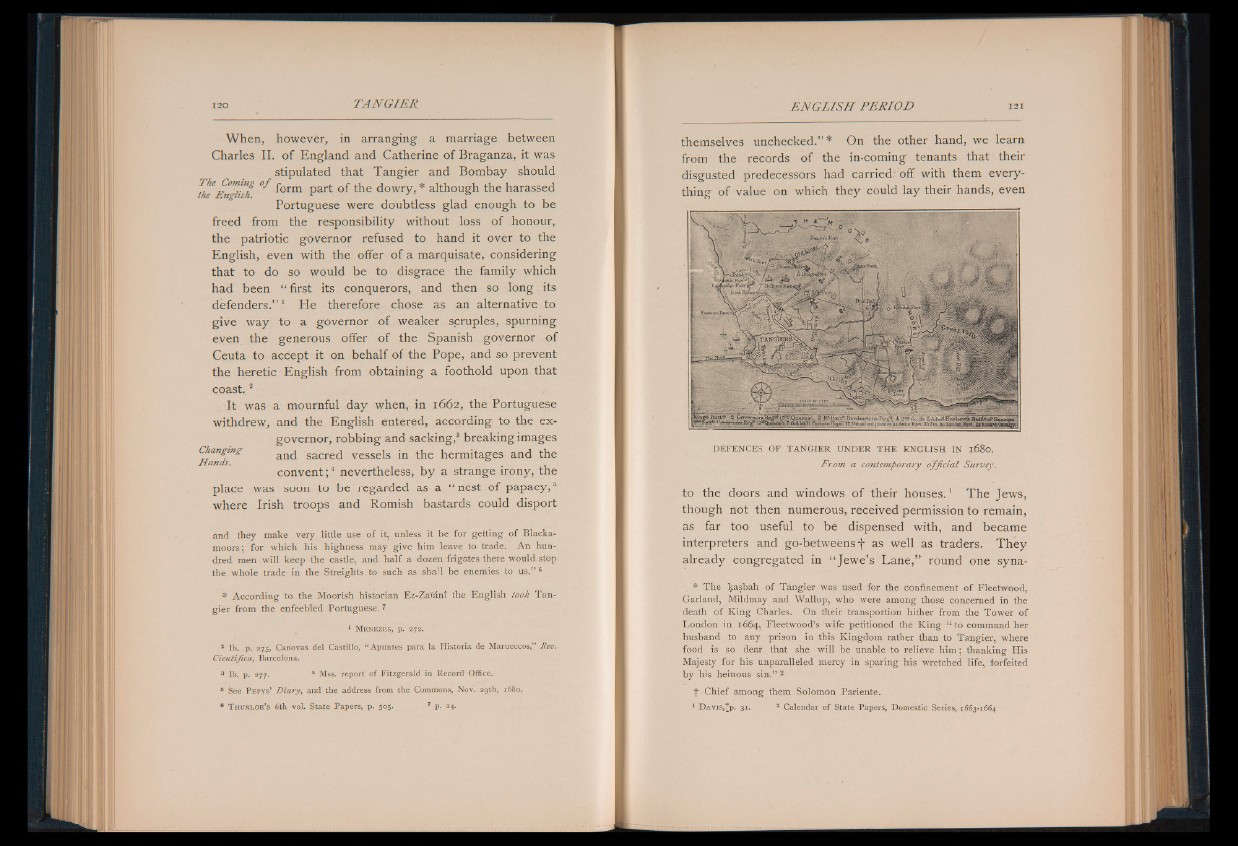
When, however, in arranging a marriage between
Charles II. o f England and Catherine of Braganza, it was
stipulated that Tangier and Bombay should
English f°rm Part ° f the dowry, * although the harassed
Portuguese were doubtless glad enough to be
freed from the responsibility without loss of honour,
the patriotic governor refused to hand it over to the
English, even with the offer of a marquisate, considering
that to do so would be to disgrace the family which
had been “ first its conquerors, and then so long its
defenders.” 1 He therefore chose as an alternative to
give way to a governor of weaker scruples, spurning
even the generous offer of the Spanish governor of
Ceuta to accept it on behalf of the Pope, and so prevent
the heretic English from obtaining a foothold upon that
coast.2
It was a mournful day when, in 1662, the Portuguese
withdrew, and the English entered, according to the exgovernor,
robbing and sacking,3 breaking images
Changing an(j sacred vessels in the hermitages and the
Hands. .
convent;4 nevertheless, by a strange irony, the
place was soon to be regarded as a “ nest of papacy,5
where Irish troops and Romish bastards could disport
and they make very little use of it, unless it be for getting of Blackamoors;
for which his highness may give him leave to trade. An hundred
men will keep the castle, and half a dozen frigates there would stop
the whole trade in the Streights to such as shall be enemies to us.” 6
* According to the Moorish historian Ez-Zafdhi the English took Tangier
from the enfeebled Portuguese. 7
1 Menezes, p. 272.
2 lb. p. 275, Canovas del Castillo, “ Apuntes para la Historia de Marueccos,” Rev.
Cientijica, Barcelona.
3 lb. p. 277. k Mss. report o f Fitzgerald in Record Office.
5 See P e p y s ’ Diary, and the address from the Commons, Nov. 29th, 1680.
6 T h u r l o e ’ s 6th vol. State Papers, p. 505. 7 p. 14.
themselves unchecked.” * On the other hand, we learn
from the records of the in-coming tenants that their
disgusted predecessors had carried'off with them everything
of value on which they could lay their hands, even
DEFENCES OF T AN G IER UNDER THE ENGLISH IN 1680.
From a contemporary official Survey.
to the doors and windows of their houses.1 The Jews,
though not then numerous, received permission to remain,
as far too useful to be dispensed with, and became
interpreters and go-betweens f as well as traders. They
already congregated in “ Jewe’s Lane,” round one syna-
* The kasbah of Tangier was used for the confinement of Fleetwood,
Garland, Mildmay and Wallop, who were among those concerned in the
death of King Charles. On their transportion hither from the Tower of
London in 1664, Fleetwood’s wife petitioned the King “ to command her
husband to any prison in this Kingdom rather than to Tangier, where
food is so dear that she will be unable to relieve him; thanking His
Majesty for his unparalleled mercy in sparing his wretched life, forfeited
by his heinous sin.” 3
f Chief among them Solomon Pariente.
1 D a v i s , ' p . 31. 2 Calendar o f State Papers, Domestic Series, 1663-1664